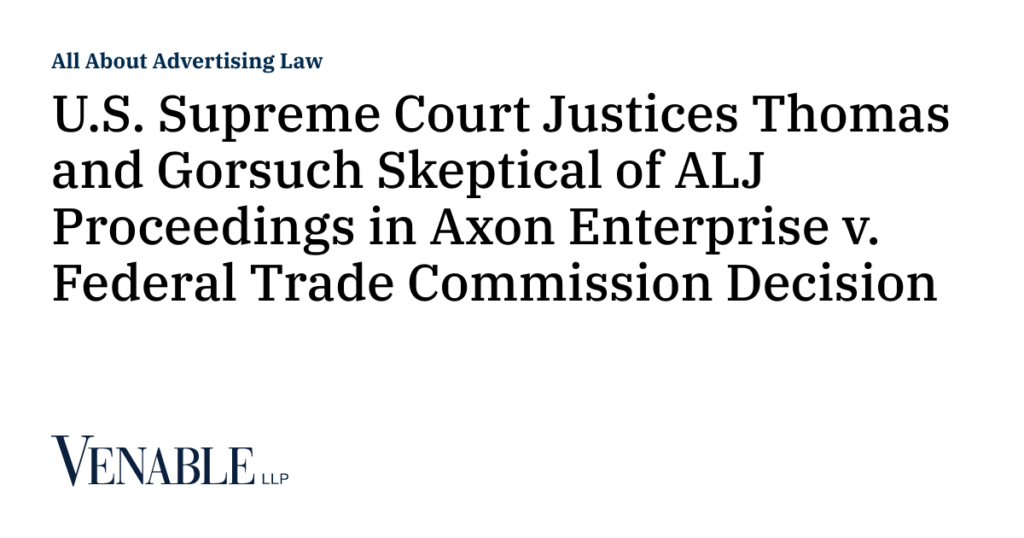U.S. Supreme Courtroom Justices Thomas and Gorsuch Skeptical of ALJ Proceedings in Axon Enterprise v. Federal Commerce Fee Determination

[ad_1]
The U.S. Supreme Courtroom’s landmark determination unanimously reversing the Ninth Circuit in Axon Enterprise v. Federal Commerce Fee is prone to signify a monumental shift in pre-enforcement challenges to administrative enforcement proceedings introduced by federal businesses, together with the FTC.
The choice held that businesses, together with the FTC, are usually not empowered to resolve whether or not their very own enforcement procedures are constitutional, eradicating the thumb from federal businesses’ facet of the size. The Supreme Courtroom emphatically dominated that such authority is reserved for the courts, and that collateral challenges to the constitutionality of administrative proceedings are applicable.
As background, the FTC can elect to litigate a celebration’s alleged wrongdoing in an administrative continuing overseen by an FTC-appointed administrative legislation choose (ALJ) or in a federal district courtroom. Till the Supreme Courtroom’s determination in AMG two years in the past, the FTC’s favored enforcement path was to proceed straight to federal district courtroom. With that avenue considerably constrained by AMG, the FTC is extra continuously bringing enforcement actions in administrative proceedings earlier than ALJs. Administrative proceedings, nonetheless, embrace a number of parts that closely favor the FTC. First, the very fact finder in an FTC continuing is appointed by the FTC. Second, the celebration topic to the enforcement continuing is pressured to attend till the continuing ends to problem the lead to a federal appeals courtroom. Furthermore, the reviewing federal appeals courtroom’s scope of evaluation is restricted to the report that the FTC produced.
As Justice Clarence Thomas famous in his concurrence, the appeals courtroom should apply a extremely deferential customary of evaluation—treating the company’s report as conclusive, offered there’s substantial evidentiary assist. In his personal concurrence, Justice Neil Gorsuch additionally famous that this course of can and sometimes does take years and require substantial sources from targets of enforcement actions, a lot of that are unable to bear such a burden and find yourself settling.
In Axon, Axon Enterprises was not content material to let the executive course of play out whereas it had grave issues concerning the constitutionality of that very course of. As we’ve beforehand detailed, when Axon realized it was the topic of an FTC company continuing relating to an acquisition it wished to make, Axon challenged the constitutionality of the continuing in federal district courtroom in Arizona to aim to cease the continuing from shifting ahead. Axon argued that the FTC’s administrative continuing was unconstitutional.
Particularly, Axon argued that:
- The FTC’s methodology for appointing ALJs was unconstitutional as a result of ALJs had been insulated from presidential management—a direct violation of the Appointments Clause in Article II of the Structure
- The FTC’s administrative procedures, whereby it acts because the prosecutor, choose, and jury—violates Axon’s Fifth Modification due course of rights
Axon argued it will be irreparably injured if the continuing continued. In the end, the district courtroom dominated towards Axon, and the Ninth Circuit affirmed that call. When the Axon case arrived on the Supreme Courtroom, it was consolidated with Securities and Trade Fee v. Cochran, which includes related constitutionality issues concerning the Securities and Trade Fee’s administrative proceedings. That case wound up in entrance of the Fifth Circuit with a special end result, whereby the Fifth Circuit permitted the collateral problem pending earlier than the district courtroom to proceed.
Utilizing the prevailing Thunder Basin three-part framework, the Courtroom’s opinion permits the petitioners in each instances to problem the constitutionality of the executive continuing in federal district courts earlier than the executive continuing is set. Thunder Basin requires {that a} courtroom contemplating whether or not to listen to a collateral problem of an company continuing should consider whether or not:
- Precluding jurisdiction in district courtroom would impede significant judicial evaluation
- The problems are wholly collateral
- The problems are exterior the company’s space of experience
Previous instances contemplating the Thunder Basin elements have met with restricted success. However, in Axon, Justice Elena Kagan, writing for the Courtroom, reasoned that the damage to Axon and Cochran is “having to look in proceedings” earlier than an “unconstitutional company authority.” The Courtroom famous that this damage can’t be remedied as soon as the continuing concludes, and that an appellate courtroom ruling to vacate the company’s order will not be ample treatment for a declare “about subjection to an illegitimate continuing, led by an illegitimate decisionmaker.”
To make sure, the choice doesn’t maintain that the executive proceedings at challenge within the district courtroom instances are unconstitutional. As a substitute, the Courtroom dominated that federal district courts are empowered to make that call. For the FTC, that call now returns to the fingers of a federal district courtroom in Arizona—though it’s nearly sure to wind its means again to the Supreme Courtroom.
When the case inevitably returns to the Courtroom, the FTC ought to be cautious of Justices Thomas and Gorsuch, who expressed severe doubt that the executive proceedings—as at the moment formulated—might survive judicial scrutiny. Justice Thomas went as far as to particularly notice that the rights at challenge in each Axon and Cochran—infliction of civil penalties and divestiture of mental property rights, respectively—are core personal rights that fall inside the sole jurisdiction of Article III courts. Justice Gorsuch took a special strategy, discovering that the Thunder Basin framework is complicated, pricey, and pointless as a result of 28 U.S.C. Part 1331 already vests the district courts with jurisdiction to listen to such claims.
This determination is prone to result in a wave of challenges to how the FTC and different businesses conduct administrative proceedings. Whether or not these challenges in the end upend or restrict the flexibility of businesses to litigate in administrative boards stays to be seen.
[ad_2]
Source_link








